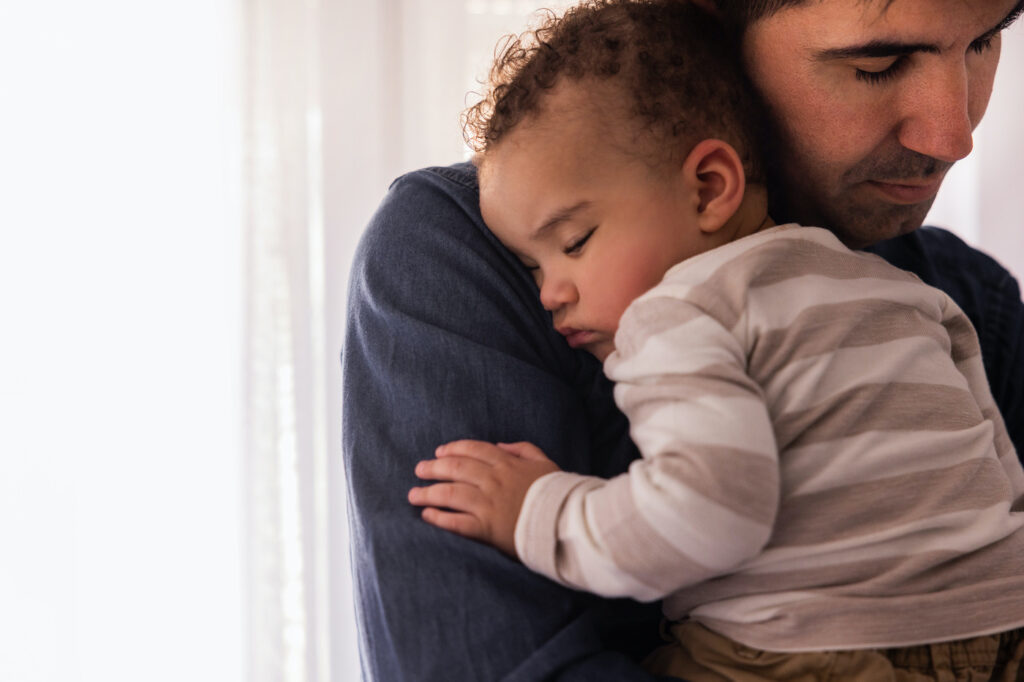What is it like to be a parent, and what might it teach us? In my own life, questions that had once seemed abstract have quite rapidly taken the form of an immersive experience: I have eighteen-month-old twin daughters, with a third daughter on the way in October, and so perhaps I can be permitted some reflections ahead of Father’s Day that I hope will resonate with others. Parenthood is full of surprises, but I’ve been struck by how I’ve come to understand it as fundamentally peaceful.
Peace is not the first thing that people typically associate with parenting. According to a Pew survey earlier this year, most parents describe parenting as “rewarding” or “enjoyable,” but significant numbers also find it “tiring” and “stressful.” These findings reflect the cost-benefit lens through which the modern world tends to view parenthood: a generally exhausting ordeal that imposes fearful constraints and burdens, while occasionally providing moments of happiness. In many ways, our most urgent social and political challenges—declining birthrates and family formation; pervasive feelings of isolation and anxiety—are the inevitable products of a cultural fixation on the costs of parenthood.
I’m not immune to cost-benefit reasoning (especially when buying diapers for twins), but I now realize that it neglects the core truth that being a parent is essentially peaceful in nature. It is peaceful not in the contemporary sense of freedom from discord (did I mention twins?). Rather, parenting is peaceful in the deepest meaning of the term, which is when we understand, embrace, love, and find joy in one another as gift.
In many ways, our most urgent social and political challenges—declining birth rates and family formation; pervasive feelings of isolation and anxiety—are the inevitable products of a cultural fixation on the costs of parenthood.
Start your day with Public Discourse
Sign up and get our daily essays sent straight to your inbox.By emphasizing the peace of parenthood, we might provide a useful corrective to the prevailing cultural narrative that views the enterprise with such ambivalence. The relationship between peace and parenthood was not obvious to me before I had kids, and I think the same is true of other young people who might be pondering the questions I opened with. While familiar notions of parenting as happy, rewarding, stressful, or intense tell us something, they don’t quite capture the whole story.
Peace
In our secular age, peace is often defined in negative terms of what is lacking or missing, such as the absence or end of conflict. In this account, peace in the public realm means freedom from civil disturbance, while inside our minds it means freedom from troubling thoughts or emotions. In this latter sense, Augustine’s view that peace is “the tranquility of order” finds faint and distorted echoes in the modern emphasis on subjectivity and psychological analysis.
But there is a deeper, spiritual dimension of peace that I believe the experience of parenting helps bring more clearly into view. We might consider the Hebrew word shalom, a comprehensive term that encompasses the positive aspects of flourishing relationships, not just the absence of hostility. We might also note that in the Catholic Mass, just before congregants offer each other a sign of peace, they are reminded that Jesus said to his apostles, “Peace I leave you, my peace I give you.” Far from an instruction to withdraw into solitude, this is meant as an affirmation that true peace is a gift from God, something positive and relational that enables us to open up to each other and establish new connections.
If we increasingly fail to see peace as something positive and oriented toward others, then we won’t associate it with parenthood.
This model of peace also works as a basic description of parenting. More than any other experience, being a parent opens us up to new life, and it deepens existing relationships within our families: husbands and wives grow closer, grandparents watch children become parents. It also encourages us to honor and delight in something outside ourselves. Our failure to see peace in its fullest sense as openness to the gift of God in others is, I think, related to growing cultural misgivings about parenthood. If we increasingly fail to see peace as something positive and oriented toward others, then we won’t associate it with parenthood. And to the extent that we see parenthood as daunting and isolating—as anything but peaceful—then it will be ever more difficult to encourage young people to form their own families.
Gift
Contrary to the modern focus on the costs of parenting, I have learned through being a parent that the true meaning of peace is the condition in which we understand one another as gift. Of course, there is a rich biblical tradition of viewing children as a gift, or a reward, from God. More broadly, this is related to the Jewish, Christian, and Islamic view that creation itself is a gift; not self-standing, but created ex nihilo, from nothing, in a free expression of God’s love that is impossible for us to reciprocate. In this sense, creation is a gift in itself, a gift that signals a relationship, and a gift that instantiates its recipients. Something similar is true of the parent–child bond, and this bears upon parenting in three important ways.
First, the category of gift highlights that parenting involves reciprocal exchange even within the context of a highly asymmetrical relationship. Parents give time, care, and love to their children, who are entirely dependent and seemingly unable to reciprocate. Yet parents also know that children do offer reciprocal gifts in the form of laughter, smiles, joy, and love. This kind of reciprocal exchange cannot be expressed in economic terms, but it’s a profound part of the parent–child relationship.
Second, when we define peace as understanding one another as gift, it follows that we give part of ourselves to the recipient. An Aristotelian philosopher might describe this as the cause imparting something of itself to the effect. By analogy, a father recognizes that to give part of himself to a child—to welcome, treasure, and love the child—is to imbue the child with something of his own character. It might be true that modern parents exaggerate the impact of their efforts, but I still treasure the time I share with my children precisely because its usefulness is not measurable. Time, care, and attention each mediate, and give meaning to, the parent–child relationship.
Third, the category of gift reminds us to embrace what we receive from our children. As social media feeds demonstrate, it’s all too easy to celebrate the pleasurable parts of parenting, the conveniently photogenic occasions when the trip to the beach goes perfectly according to plan. But what about the less glamorous moments? As Public Discourse writer Nathanael Blake observed: “Changing a diaper is not that difficult. Doing it in the dark at 3:30 a.m. after a few weeks of rarely sleeping for more than ninety minutes at a stretch, while being screamed at, is the hard part.” Like so many others, I’ve learned that embracing the hard parts of parenting turns out not to be so hard after all; it’s a natural function of the peace of parenthood, of finding joy in what comes to us from our children—in all its gloriously messy forms.
A father recognizes that to give part of himself to a child—to welcome, treasure, and love the child—is to imbue the child with something of his own character.
Joy
So far, I’ve suggested that peace is not just the absence of conflict, but something positive, a state when we open up to the new life for which we are responsible and which presents itself to us in its own unique way. In addition, the other aspect of peace that I’ve come to appreciate through parenting is that it is characterized by joyful relationships. In his excellent dictionary of scholastic philosophy, Bernard Wuellner defines internal peace as “the calm and joy of soul in its love of a possessed good without further intense effort or uncertainty.” As it relates to parenting, I’d add that peace is not simply an internal state, but something outward-looking, oriented toward others.
That parenting is joyful might not seem like much of a revelation. On the other hand, parents often look harried and feel panicked. Though parenting is stressful, it gives rise to joyful relationships in which we feel fundamentally at peace because we’re not afraid or distracted, no longer striving for unattainable things or preoccupied with trivial concerns. There is, as Wuellner put it, no need for “further intense effort or uncertainty.” Michael Oakeshott noted that a child’s game is joyful because it has “no ulterior purpose, no further result aimed at; . . . it is not a striving after what one has not got.” The same might be said of parenting itself, of loving and treasuring our children for who they are and not for the value or utility of what they can offer.
Today it often seems that parenting is seen in the same way that some historians have viewed history: just one thing after another. One more obstacle to overcome; one more fire to put out. But my own experience has taught me not only that peace is (perhaps surprisingly) central to parenting, but that parenting itself offers us a positive vision of peace to inhabit—the opportunity to embrace, love, and find joy in one another as gift.














